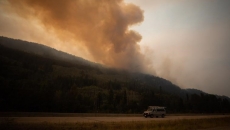OTTAWA — Canada's homeownership rate is on the decline, with young adults in particular less likely to own a home in 2021 than they were adecade earlier, says Statistics Canada.
According to the latest census release, 66.5 per cent of Canadians owned a home in 2021, down from a peak of 69 per cent in 2011.
Housing prices have climbed considerably in recent years compared with Canadians' incomes. Statistics Canada says while the median household income grew by 18 per cent between 2016 and 2021, the average value of an owner-occupied home rose by 39.6 per cent.
"When the price of buying a home grows faster than household incomes, it becomes more difficult for people to afford buying a home," the report said.
The decline in homeownership rates between 2011 and 2021 was the largest for younger Canadians, with the rate falling to 36.5 from 44.1 for those between the ages of 25 and 29.
Canadians between the ages of 30 and 34 experienced a similar but slightly smaller decline in homeownership, falling to 52.3 per cent from 59.2 per cent.
Mike Moffatt, an assistant professor at Western University's Ivey School of Business, said data about these age groups illustrates why the overall homeownership rate is not as useful for understanding recent trends.
“As people get older, they're more likely to own a home,” he said. “That's why I think it's going to be important to break down the data by age cohort.”
Meanwhile, more Canadian households are renting. Statistics Canada says the number of renter households grew at more than twice the rate of owner households between 2011 and 2021.
Brittany MacKenzie, a real estate agent in Fredericton, N.B., said she’s noticed a shift in the attitudes of young people hoping to become homebuyers as prices have risen.
“I have found that a lot of our younger buyers have been hesitant now and have exited and decided to rent for a little bit,” she said.
The federal agency says newly built homes are increasingly likely to be occupied by renters, with 40.4 per cent of new homes built between 2016 and 2021 now rented out.
Statistics Canada also compared monthly shelter costs of renters and homeowners and found those costs rose faster for renters than homeowners in the latest census period.
The median monthly shelter cost for renters went up 17.6 per cent between 2016 and 2021, outpacing inflation, as the consumer price index rose by 9.5 per cent over that same period. For homeowners, the median monthly shelter cost went up by 9.7 per cent.
Housing affordability actually improved in 2021, but one in five renters still spent more than 30 per cent of their income on shelter costs.
Statistics Canada says the improvement in affordability was the most pronounced for low-income renters and can be largely attributed to temporary COVID-19 income supports.
Moffatt said the data doesn't give an accurate depiction of housing affordability because of these support measures.
"It's going to be quite misleading just because people were receiving this sort of one-time boost to incomes," Moffatt said.
Since the census data was collected, the housing market has changed. Home prices continued to rise before falling dramatically in 2022 as interest rates rose.
According to the Canadian Real Estate Association, the national average price of a home sold in August was $637,673, down 22 per cent since February.
Eric Olson, an assistant director at Statistics Canada's centre for income and socioeconomic well-being statistics acknowledged that these changes need to be taken into consideration when assessing the state of housing today.
"Obviously, the interest rates will have a direct bearing on the shelter costs for anyone who is undertaking a new mortgage or renewing a mortgage," Olson said during a news conference on Wednesday.
Moffatt said in addition to falling home prices, rent prices have risen considerably since the spring of 2021.
“That's just due to the overall housing shortage and the fact that those higher interest rates are expenses for landlords, and they're passing those expenses on to tenants whenever they can,” Moffatt said.
According to the most recent consumer price index report, rent was up 4.7 per cent in August compared with a year ago.
The censusreport published on Wednesday also touches on the rising trend of condominium construction, especially in urban centres. Between 2016 and 2021, over half of the homes built in Toronto, Vancouver and Montreal were condos.
Millennials made up the largest share of the approximately 4.3 million Canadians living in condos in 2021, with nearly three in 10 condo-dwellers being in that age cohort.






